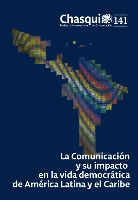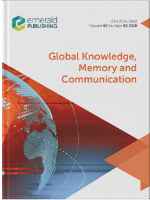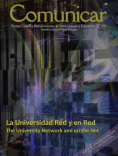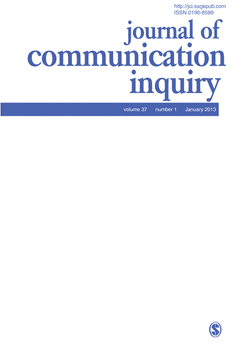
Fonseca-Journal of Communication
Scope & Guideline
Empowering Voices through Rigorous Peer-Reviewed Scholarship
Introduction
Aims and Scopes
- Interdisciplinary Research in Communication:
The journal publishes work that spans various fields including media studies, education, sociology, and cultural studies, allowing for a rich exploration of how communication shapes and is shaped by societal contexts. - Focus on Educational Communication:
A significant portion of the research addresses the role of communication in educational settings, including the impact of technology on learning, student engagement, and pedagogical strategies. - Cultural Representation and Analysis:
The journal frequently explores the representation of diverse cultures and identities in media, examining how these representations influence public perception and social dynamics. - Emerging Technologies and Digital Media:
Research on the implications of new technologies, such as social media, virtual reality, and artificial intelligence, is a core focus, reflecting the journal's commitment to addressing contemporary communication challenges. - Prosocial Communication Practices:
The journal is dedicated to examining how communication can foster social good, including studies on prosocial narratives, ethical media production, and inclusivity in communication.
Trending and Emerging
- Impact of Digital Communication on Society:
The journal increasingly addresses how digital communication platforms influence social interaction, political engagement, and cultural expression, highlighting the transformative effects of technology on everyday life. - Prosocial Narratives and Media:
There is a growing interest in how narratives within media can promote prosocial behaviors, inclusivity, and cultural understanding, reflecting a trend towards socially responsible communication. - Intersection of Media and Mental Health:
Research exploring the relationship between media consumption and mental health issues is emerging, particularly in the context of digital environments and their impact on well-being. - Cultural Diversity and Representation:
The journal is placing more emphasis on studies that investigate cultural diversity and representation in media, reflecting broader societal movements towards inclusivity and equity. - Ethics in Communication Practices:
There is an increasing focus on the ethical implications of communication practices, especially in relation to emerging technologies and their societal impacts, indicating a trend towards responsible scholarship in the field.
Declining or Waning
- Traditional Media Analysis:
There seems to be a waning interest in the analysis of traditional media forms such as print journalism and television, as newer digital media platforms gain traction in scholarly discourse. - Static Communication Models:
Research focusing on static models of communication, which do not account for the interactive and participatory nature of modern communication, appears to be less prevalent. - Historical Media Studies:
While historical perspectives remain important, there is a noticeable decline in publications focused solely on historical media analysis, as contemporary issues take precedence. - Local and Regional Case Studies:
The journal has seen fewer studies focusing exclusively on local or regional media phenomena, possibly as the field moves towards more global and comparative analyses. - Niche Genre Studies:
There is a decrease in research dedicated to niche genres in film and media, as broader thematic explorations and the impact of mainstream genres dominate the conversation.
Similar Journals

Review of Communication Research
Elevating Research in Communication Theory and PracticeReview of Communication Research is a prestigious open-access journal dedicated to advancing the field of communication studies. Published by REVIEW COMMUNICATION RESEARCH from its base in Madrid, Spain, this journal has established itself as a vital platform for scholarly discourse since its inception. With an impressive impact factor and ranked in the Q1 quartile of communication journals for 2023, it holds a commendable position, placing it within the top 13% of approximately 511 journals in the communication category on Scopus. Since becoming open-access in 2013, the journal has enabled researchers, professionals, and students to access high-quality research without financial barriers, thereby fostering a greater dissemination of knowledge and dialogue within the community. Covering a wide array of topics from communication theory to media studies, the Review of Communication Research continues to contribute significantly to the understanding and evolution of communication in today’s interconnected world. Researchers are encouraged to engage with and submit their findings to this influential journal to further enrich the scholarly landscape.

Chasqui-Revista Latinoamericana de Comunicacion
Championing Open Access for Scholarly GrowthChasqui-Revista Latinoamericana de Comunicación is a distinguished academic journal dedicated to the field of communication in Latin America. Published by CENTRO INT ESTUDIOS SUPERIORES COMUNICACION AMER LATINA-CIESPAL, this journal has been an Open Access resource since 1972, promoting the dissemination of knowledge and fostering scholarly dialogue across diverse communication disciplines. With its ISSN of 1390-1079 and E-ISSN of 1390-924X, Chasqui invites researchers, professionals, and students to explore a wide range of topics, from media studies to intercultural communication, contributing to the understanding and advancement of communication practices in the region. The journal not only supports the growth of academic inquiry but also encourages the publication of innovative research that addresses contemporary issues faced in the communication landscape of Latin America. With its enduring commitment to accessibility and scholarly excellence, Chasqui serves as a vital platform for voices seeking to shape the future of communication studies.

Turkiye Iletisim Arastirmalari Dergisi-Turkish Review of Communication Studies
Exploring Diverse Perspectives in Communication.Turkiye Iletisim Arastirmalari Dergisi, also known as the Turkish Review of Communication Studies, is an esteemed academic journal published by Marmara University, Faculty of Communication. Since its establishment as an Open Access journal in 2000, it has been committed to advancing the field of communication studies, offering a platform for innovative research and discourse in this dynamic discipline. With an ISSN of 2630-6220, the journal seeks to bridge the gap between theory and practice, addressing various sub-disciplines such as media studies, interpersonal communication, and public relations. Situated in the vibrant academic landscape of Istanbul, Turkiye, the journal aims to foster scholarly dialogue among researchers, professionals, and students, contributing significantly to the global communication research community. As it continues to grow in relevance and impact, Turkiye Iletisim Arastirmalari Dergisi plays a vital role in promoting diverse perspectives and enhancing the understanding of communication processes in contemporary society.

Comunicacion y Sociedad-Guadalajara
Empowering voices through accessible academic discourse.Comunicacion y Sociedad-Guadalajara is a distinguished peer-reviewed journal published by UNIV GUADALAJARA that plays a vital role in the field of communication studies. With an ISSN of 0188-252X and an E-ISSN of 2448-9042, this journal has embraced Open Access since 2023, ensuring that groundbreaking research is accessible to a wider audience. Hailing from Mexico, it serves as a platform for innovative research and critical discourse in communication, ranking Q2 in the Communication category and securing a notable Scopus rank of #[232/511, positioning it within the top 54th percentile of its field. Covering converged years from 2009 to 2010 and from 2013 to 2024, the journal's objective is to foster scholarly dialogue and advance knowledge across diverse aspects of communication. With a commitment to excellence, Comunicacion y Sociedad-Guadalajara stands as an essential resource for researchers, professionals, and students seeking to engage with contemporary issues in communication.

Connectist-Istanbul University Journal of Communication Sciences
Exploring Innovative Frontiers in Communication SciencesConnectist-Istanbul University Journal of Communication Sciences is a distinguished academic publication under the auspices of Istanbul University, Faculty of Communication, dedicated to advancing the field of communication studies. Since its inception, this Open Access journal has facilitated the dissemination of groundbreaking research and innovative methodologies, particularly since it embraced an open access model in 2017, promoting wider accessibility and engagement. As a pivotal resource for researchers, practitioners, and students alike, Connectist fosters interdisciplinary dialogue, exploring contemporary issues in communication, media studies, and related disciplines. With a commitment to rigorous peer review and scholarly excellence, the journal serves as an essential platform for cutting-edge insights and developments in communication sciences, thereby contributing significantly to the academic community and beyond.

Global Knowledge Memory and Communication
Exploring the Dynamics of Memory and Information SharingGlobal Knowledge Memory and Communication, published by EMERALD GROUP PUBLISHING LTD, is a leading journal in the field of Library and Information Sciences, with an impressive 2023 Q2 ranking in its category. With an ISSN of 2514-9342 and an E-ISSN of 2514-9350, this journal has been at the forefront of research since its inception in 2018 and is expected to run until 2024, showcasing significant contributions to the nexus of knowledge management and communication practices. Based in the United Kingdom, the journal's editorial scope encompasses diverse perspectives on how knowledge is created, shared, and retained in an increasingly digital world, making it a vital resource for researchers, academics, and practitioners in the social sciences. Furthermore, with its current Scopus ranking of #58 out of 280 in the library and information sciences category, which positions it in the top 79th percentile, the journal engages a global audience committed to advancing knowledge across disciplines. Though it is not an open-access journal, its rich and diverse content ensures it remains accessible to a wide readership, enabling meaningful discourse and innovation in the field.

Media Education-Mediaobrazovanie
Advancing Media Literacy for a Digital AgeMedia Education-Mediaobrazovanie is a prominent journal that focuses on the interdisciplinary field of media education, a vital area of study in today's digital and information-driven society. Published by Cherkas Global Univ Press, this journal aims to advance the knowledge and practices surrounding the integration of media in educational settings, exploring the implications for teaching, learning, and societal engagement. Although it currently does not offer open access options, the journal is committed to providing a platform for rigorous research, theoretical discussions, and innovative practices related to media literacy and education. The journal’s ISSN is 1994-4160 and the E-ISSN is 1994-4195, ensuring that the work published reaches a broad academic audience. With the rise of digital communication and media consumption, Media Education-Mediaobrazovanie plays a critical role in preparing educators and researchers to navigate and harness the power of media in educational contexts. It serves as an essential resource for those seeking to enhance their understanding of media's impact on education and society.

Comunicar
Elevating voices in Communication and Cultural Studies.Comunicar is a prestigious academic journal published by Oxbridge Publishing House, focusing on the fields of Communication, Cultural Studies, and Education. Since its launch in 2002, the journal has operated under an Open Access model, ensuring that research is freely available to a global audience. Based in Spain, Comunicar has established itself as a leading publication, holding a Q1 ranking in 2023 across all its disciplines. It ranks in the top 1% of social sciences journals for Cultural Studies and Communication, and in the top 4% for Education, reflecting its significant impact and reach within these vital areas of study. The journal not only showcases innovative research but also promotes interdisciplinary dialogue, making it an essential resource for scholars, professionals, and students aiming to stay abreast of the latest developments in communication theory and practice.

Journal of Communication Inquiry
Fostering Innovative Research in Communication and Cultural InquiryJournal of Communication Inquiry, published by SAGE PUBLICATIONS INC, is a premier interdisciplinary journal that serves as a vital platform for scholars and practitioners in the fields of communication, cultural studies, and the arts and humanities. With a rich history dating back to its inception in 1974, the journal has consistently upheld rigorous academic standards, reflected in its impressive rankings within the Q1 and Q2 quartiles across various disciplines according to the latest metrics. The journal's comprehensive scope encompasses theoretical and empirical research, catering to a diverse readership who are keen to explore contemporary communication issues and cultural dynamics. While the impact factor is not explicitly stated, the journal's Scopus ranks position it favorably within its categories, with notable percentiles that highlight its influence in the academic community. As an essential resource for researchers, professionals, and students alike, the Journal of Communication Inquiry invites contributions that advance the discourse surrounding communication practices and cultural phenomena, contributing to the ongoing dialogue in these evolving fields.

Plaridel
Transforming Ideas into Impactful Research.Plaridel is an esteemed academic journal dedicated to the field of communication, published by the University of the Philippines Diliman. With the ISSN 1656-2534, this journal embraces a significant role in fostering scholarly dialogue and advancing research within the rapidly evolving landscape of communication studies. As one of the platforms in the Philippines, it aims to uplift local and international discourse by featuring innovative research, critical reviews, and theoretical explorations relevant to various facets of communication. Although currently rated in the Q4 quartile for 2023 in the Communication category, Plaridel's commitment to quality and scholarly rigor reflects a promising trajectory for future impact. The journal has been operational since 2018 and welcomes a wide array of contributions, especially from emerging scholars. Open access provides greater accessibility to researchers and enthusiasts, promoting broader engagement with the journal’s content. Plaridel holds an important place within the academic community, aspiring to elevate standards of communication research and practice in the Philippines and beyond.